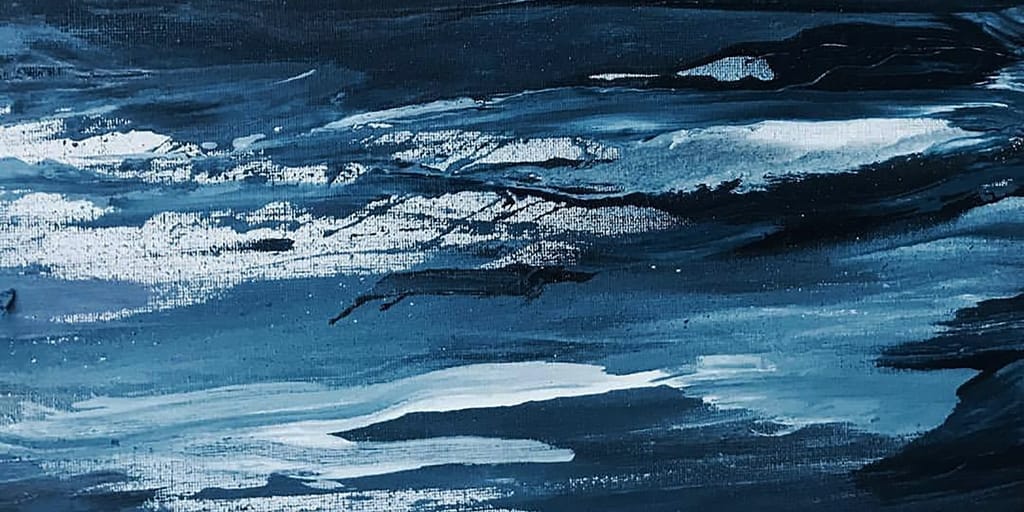The following is an excerpt from An Approach to Black, a novella by Emily Jeremiah.
An Approach to Black by Emily Jeremiah
His books do well. The picture-book idyll of our house, a wooden ship in its meadow sea, sprawling ever more as new rooms are tacked on, year after year. How pretty it is, with striped rugs and cheerful hangings, begonias flowering on sills and shelves, rosy children, pegged-up laundry. The narrator of my artist-husband’s illustrated tales is our daughter. A sweet conceit. And I? A bonnet, a pale cheek, a few stray tendrils of hair. ‘My mother used to paint, too, but now she looks after us and the house.’
He came from Paris today. The children clustered round him. We ate cinnamon buns under the whispering leaves of the birch, in view of the lake.
I asked him whom had he seen, and I could picture them, crowded into rooms, huddled over stoves, a brazen nude shivering on the table. Albert, of course. Kalle. Boulevards, and parks, and cafés, and attics, and coarse red wine.
‘And Helena?’ I asked.
The light of the oil-lamp flickered as I sat darning, the children in bed. There is colour all around, for he loves it. Red, especially. That combats the dark of the evenings, a little. In the day, it screams at me. Green, I love; the colour of hope.
The green pear in Helena’s painting is recumbent, nonchalant, its stalk woody and rough. The green is speckled, stippled, lined with swerving brown arcs. At the base of the pear sits a dark rosette.
As well as red, Eino loves fine shirts and waistcoats, and tobacco, and cognac, and evenings in restaurants and theatres. And travel, movement.
A bright blue sky, and the children went to the lake. And a letter from Helena. She tells of a prize she won – her painting was praised as daring and masculine.
I remember us as young students. It wasn’t so long ago. There was that evening gathering in a crowded room. Helena was talking to another student, gesticulating fiercely. The man I was sitting with tickled my cheek with a feather. He had been to Italy. I was envious. That was Eino: mop of brown curls and laughing eyes. Like a kitten, or a squirrel – that quickness, that zest.
Music, dancing. Crunchy snow afterwards and I remember imagining myself in Italy, in a white dress, and the zestful eyes looking at me.
Secret notes from Eino after that and a secret radiance about me through the winter. And then marriage and a frothy white dress, and the church garlanded with flowers, and a long table under birch trees. I was hot and dazed in the sun, bitten by mosquitoes. Helena had gone to Italy.
She is here. I watched and waited, saw them from afar coming from the station in the trap. Her eyes pierced me, as from a stern portrait, when she came in. ‘Anna,’ she said simply. She is a picture of herself. What do I mean? She is herself. I am myself, too, of course. The children were shy. ‘Come in,’ I said. But she already was in. I felt like a child.
I ushered her to the table: flowers in a vase, two kinds of cake, pretty cups. ‘Sit,’ I said. ‘Tell me about Paris!’
‘Oh, Paris…’ she answered, almost mockingly.
I lifted my cup, felt myself frown. Was she mocking me, or herself?
She seemed to relent. ‘Good,’ she stated. ‘My painting was well received, as I wrote…’ She bit her lip, as if ashamed. Her long fingers played with the handle of her pretty, porcelain cup, which didn’t match her severity. I wondered if the same went for the whole house – was she out of place here?
I nodded permission at Olavi to leave the table; he wiped his jammy mouth with his sleeve. Eino began to talk of his plans for the following day, about a dealer he was to meet.
By the lake, I asked her if it was good to be home, and she said, ‘Home?’ Always this pushing away. The sky was a brooding grey. The children were throwing pebbles into the water, running around the shore – too cold to swim. The fullness of them.
‘Finland,’ I said with a harsh tone, and she looked right at me. A crow cawed, and we both looked at it, then at each other again. The sight of the black bird in the birch tree, the jet feathers, the green fall of foliage, took us both briefly away from the push-pull between us.
Wisps of brown hair, escaped from their bun, played around her face, in stern three-quarters profile. I would like to paint her, I thought then, with her face angled just that way, against a silver-grey background.
‘I’m not sure that home is a place for me,’ she said, frowning. She still walks in that odd, slightly jerky way; an ungainly, endearing puppet. She was wearing a dark, plain dress. She does not like people to look at her.
‘What is it then?’ I asked. I looked straight ahead, at the house. Red-painted, with white-bordered windows, surrounded by trees. My home. The children ran on ahead, whooping and crowing. They sent birds shooting up out of the trees.
Helena finally responded: ‘I don’t know. A feeling, perhaps…’
‘And where are you living now?’ I asked.
‘I will stay with Liisa, at least for six months or so. And then I hope to go to Provence for a time. The Englishwoman I lodged with in Paris has friends there.’
I learnt that this Englishwoman was called Margaret. She was from a well-to-do family that despaired of her passion for art and her failure to marry.
Helena suddenly sat down on a mossy rock and looked up.
‘You don’t paint now?’ she pushed.
I stared down at her.
An excerpt from An Approach to Black by Emily Jeremiah (£8.99)

